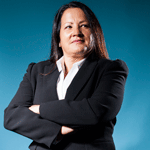Today, Terex Corporation is the T-Rex of manufacturing. With origins dating back to 1925, the company—NYSE:TEX and number 351 on the Fortune 500—has grown steadily over its history. Eric Cohen, senior vice president, general counsel, and secretary, joined the organization in 1998, after serving as outside counsel. Since then, the company has gone from revenues of $700 million to more than $7 billion. Cohen, once the sole in-house Terex attorney, now leads a staff of 20, is responsible for all legal activities, and serves as a member of the executive leadership team. I was interested to hear how he made the transition and helped fast-track the company’s growth.
Although you were once an associate and a partner at an outside law firm, you’ve been in-house with Terex for more than 15 years and contributed to amazing growth. What lured you to corporate law?
Eric Cohen: Terex was a client of my firm, and I started doing more and more work for them. They asked me to become general counsel and, after some initial hesitation to leave the law firm environment, I joined in 1998. I just thought it fit my skills. I was a corporate generalist and a securities lawyer.
And you were familiar with the company.
Cohen: Right. I left a partnership at a large firm because I saw an opportunity to be part of something that had amazing potential. I started looking at Terex and believed in the management team and long-term growth potential, and I wanted to be a part of it.
Beyond the potential of pure growth, what did you want to be a part of exactly?
Cohen: I saw a company culture of inclusion. While many of the constituent parts of Terex have a very long operating history, Terex was a relatively young public company and had been growing, but it wasn’t one of the very top institutional companies that can make employees feel like just an unknown part of the machine. Still today, whether people have been here 1 year or 15 years, they feel like they are contributing, like they are building and changing something real. We’ve maintained a real sense of ownership that you just don’t have at massive institutional companies, and I could see that aspect from the very beginning.
A few years before you joined Terex, a new CEO took the helm, resulting in a bit of a shake-up as a small recession hit. Did that contribute to your decision to join the company?
Cohen: [The leadership team’s] response did more so. As a new CEO joined, I looked at the management team, how they led, and where they were going. They had just started some great acquisitions that helped tremendously, and in my view were clearly positioned for great things.
For some lawyers, the transition to the corporate world can be a bit bumpy, but you’ve navigated it well. What made it work in your case?
Cohen: I was overseeing a lot of Terex’s legal work already. I had spent 30–50 percent of my billable hours at the outside law firm on Terex. I was also very comfortable with the business side and ready to make a contribution.

Were you surprised at the astonishing pace of growth?
Cohen: No, because it comes from the culture I saw and the culture that attracted me to the job. The leaders empower team members around the world to do their jobs. They provide the resources. Terex really values servant leadership, which we see as an inverse pyramid. Leaders on the bottom provide tools, training, and assistance. It’s a chain of support instead of a chain of command, and that sets you up very quickly for success with a good foundation. So, no, I wasn’t surprised.
But even though you knew there could be success, going from $700 million to $7 billion is tremendous. How did you experience that from the inside? What made the biggest difference?
Cohen: We started a new thought pattern in the early 2000s that perpetuated a cultural change. The inverse pyramid and servant leadership I mentioned were not always in place. We were once an organization that pushed a chain of control with commands from the top down. We started to focus on really changing that, and I believe that new philosophy really made a big difference.
There were also several important acquisitions during this period. What drove that strategy and why did it work?
Cohen: When people think of Terex, they think of a company like Caterpillar Inc. (CAT)—a large construction and equipment company. But we’ve tried to get into products and niches around core construction competitors like CAT. CAT is many times our size with resources that far exceed ours. So, we turned to acquisitions to upgrade our product line and get into lines that were away from the core construction product lines so we could be the first, second, or third largest global player in one line. That has been our strategy. We have diversified both geographically and in products. Now, our revenues are approximately 40 percent domestic, 30 percent from Europe, and 30 percent from the rest of the world.
What kind of role has legal played in all that?
Cohen: The CEO and business executives bring in deals and we wrestle them to the ground [laughs]. But really, we touch a lot of what happens, and the CEO and business executives value the legal team. At Terex, employees who come to work know one thing: they never know what they’ll be working on. It makes it fun because it’s new every day. We’ve done cutting-edge work in capital markets and acquisitions. You don’t get bored here.
The work keeps your team on its toes.
Cohen: Yes, and we’re trained to be responsive and to do what it takes to get the job done. You hire the best people, train them to understand the business environment, and really empower them to fit in and work. I have two rules: The first is, never say no but understand what the goal is and figure out how we can help the business achieve what they want in a legally compliant way. The second is to be responsive. Every question should receive a response the same day, even if the answer is that it needs to wait until tomorrow. People do not like to be ignored, and I do not want legal to be viewed as the black hole where requests languish.
When did you feel like you were on the right track and your plans were working?
Cohen: I think if I was offered this job a few years earlier, I wouldn’t have accepted it. I saw things starting to change when I was asked to join, but it was during the period between 2002 and 2007 that I saw the company really take off and begin to excel. It was the fruit of our acquisitions coupled with a good economy and internal growth. Everything was really coming together.
It sounds like you’re involved in quite a bit—your business card lists three titles. What do you consider your most important role?
Cohen: Well, legal is a very centralized group, because there aren’t a lot of truly centralized departments outside of legal. So many things come our way and we become a funnel for much of it. Our role is often to help other players understand what is happening in many areas. We don’t have a chief administrative officer at Terex, but I help fill that role in a number of areas. It’s great, because it gives me a lot of in-depth views and perspectives that let me help others reach decisions.
That sounds like it could quickly become overwhelming.
Cohen: Even as a partner in my firm, I was interested in the business side of things. My background is in business law, and I was giving business legal advice to companies early in my career. I’ve been here over 15 years, so I have a comfortable understanding of the company history and our industry that not everyone in the organization has.
What have you been the most proud of?
Cohen: I think it’s the fact that the philosophy is working. Our goal was to bring more work in-house and make it a part of the company. We’re winning trust and demonstrating that we add value. The legal team has grown because the rest of the company respects us and is asking for more.
And now?
Cohen: And now we keep moving forward. It’s important to me that I train and develop the team in an ongoing way. I’ve been here a long time, and it is a goal of mine that my replacement be an internal candidate. To me that would be the final success of my long career at Terex.

